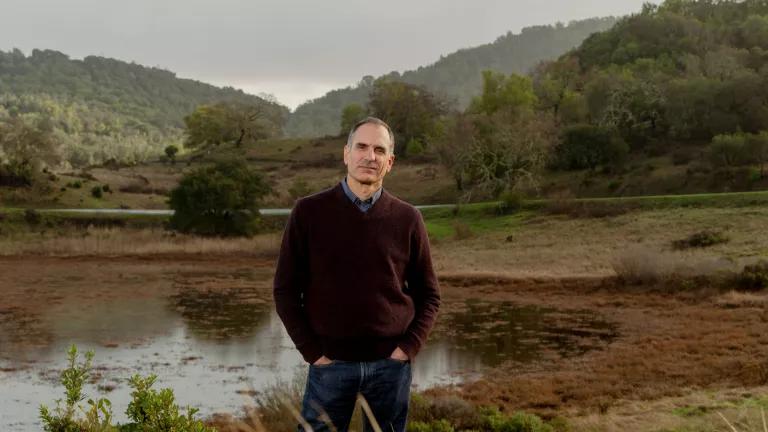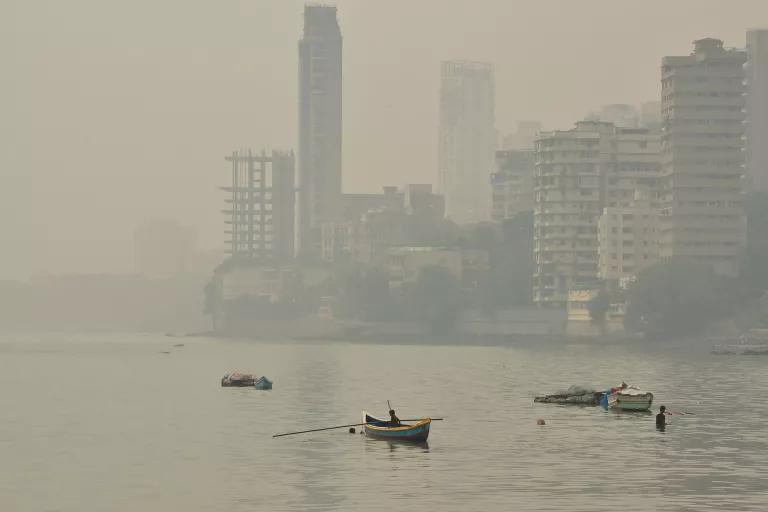A Prosecutor Comes Home
NRDC’s new chief program officer, Drew Caputo, has roots in the organization that go back decades, but his focus is squarely on the future.

Drew Caputo at China Camp State Park in California
One of NRDC’s newest hires, Drew Caputo, is no stranger to the organization. He first joined NRDC as a senior attorney back in 1993 and spent more than a dozen years in court defending the country’s wetlands, fisheries, water, and air. After leaving NRDC in 2006, Caputo moved to the U.S. Attorney’s Office in San Francisco and later to Earthjustice, where he served as vice president of litigation. Now he has returned to NRDC to oversee work in our Climate & Clean Energy, International, Nature, and People & Communities programs. We spoke to him recently at our New York headquarters about his new job as chief program officer and about the challenges—and opportunities—that await him.
What kinds of things do you expect will be keeping you busy in your new post?
One of NRDC’s huge strengths is its size and breadth. This allows us to take comprehensive environmental action. At the same time, focus is essential for maximum impact. I view my role as optimizing and coordinating our programmatic advocacy in order to make it as strategic and effective as possible.
As a group, we need to pick our priorities, make sure we have really good strategies to achieve them, and then resource those priority strategies to maximize our impact. It’s like turning a group of brilliant individual musicians into a symphony—getting everyone to move as seamlessly as possible together, in the same moment.
The world has changed a lot since you left NRDC 16 years ago. In what ways has the organization changed in that time?
One difference is just the sheer size of NRDC: I would guess that when I left there were no more than 250 people working here—which seemed really large at the time! Now we’re almost three times that size. On top of that, the scale of professional competence here has gone through the roof. When I was here the first time, [the NRDC business policy initiative] Environmental Entrepreneurs, or E2, existed, and it was certainly robust. But there was exactly one person who was staffing that operation. Now it’s much, much bigger, which means that what E2 can do in terms of furthering its advocacy mission is much more sophisticated. Another example: There was an international program when I was here before, but it had a limited footprint. Now we have 40 people in Beijing, and we’re about to open an office in New Delhi to focus on our work in India. That international expansion is really powerful.
There are also some through lines. NRDC has always been filled with people who make stuff happen. I definitely feel today what I felt on the very first day I arrived in 1993—there’s just this incredible sense of shared purpose and mission and enterprise and an amazing amount of professional skill in the ranks.

In what ways can NRDC’s programmatic work further environmental justice?
Inequity drives a huge number of environmental problems, and restoring equity is a crucial part of the solution for all of them.
There are three great global crises right now. There’s the climate crisis, which most people are aware of. There’s the biodiversity crisis, which I think many fewer people are aware of. And then there’s a third crisis that doesn’t really get talked about enough, and that’s the public health crisis. Year in and year out, about nine million people around the globe die prematurely from pollution.
These deaths don’t fall evenly; they fall inequitably along lines of race and class. That’s totally outrageous, and it doesn’t have to be this way. The solution is to make sure that we are, first and foremost, paying attention to those whose health, communities, and livelihoods are suffering the brunt of environmental harms. Advancing equity also lies at the heart of the solutions to the other crises, climate and biodiversity. We can’t allow ourselves to make the same mistakes we’ve made in the past by sidelining equity issues, creating new problems as we try to solve existing ones.
NRDC’s ambition is to make America a better place, to make the world a better place. But the only way we can do that is to have credibility with America and with the rest of the world and all the diverse peoples therein. To gain that credibility, we need to center equity in terms of what we prioritize, how we show up as a partner with other communities, and how we look and function as a staff.
You’ve worked as a federal prosecutor. What lessons or skills did you take from that role that you may bring to bear in your new one?
When you first become a prosecutor, they hand you a whole bunch of cases. As a lawyer—especially early in my career—I wanted to understand every last aspect of every problem before making a decision and moving forward. But that takes a long time. So one of the things I learned as a prosecutor early on is: You’ve got to keep moving.
Those three planetary crises I mentioned earlier? They’re getting worse every day, and they’re not going to get any better while we try to figure out the optimal approach. I want to help NRDC be ready and able to jump into action as fast as we possibly can. We may not get it right out of the box the first time. But I think, as a general matter, there’s no time to waste. We need to be swinging for the fences.

In such a volatile political climate—where no success can be taken for granted and where the balance of power is always shifting—how can NRDC ensure that its victories have staying power?
It’s a good question, because we’re not just looking to make change; we’re looking to make durable change. We want to make positive change that’s as “sticky” as possible—or, to put it another way, we want to make it as hard as possible for polluters and their allies to undo it.
The environmental community has gotten really good, and really comfortable, at maximizing its ability to make change through litigation and through achieving administrative action when a friendly administration is in power. And those will always remain important tools. The single biggest thing I enjoy doing is filing and winning lawsuits to make positive change! But we’re not going to be able to solve the climate crisis or the biodiversity crisis or the public health crisis without passing legislation. We need to build political power over the longer term—and then we need to use that political power to fight and win legislative battles to deal with these crises. That’s the best way to make lasting change.
This NRDC.org story is available for online republication by news media outlets or nonprofits under these conditions: The writer(s) must be credited with a byline; you must note prominently that the story was originally published by NRDC.org and link to the original; the story cannot be edited (beyond simple things such as grammar); you can’t resell the story in any form or grant republishing rights to other outlets; you can’t republish our material wholesale or automatically—you need to select stories individually; you can’t republish the photos or graphics on our site without specific permission; you should drop us a note to let us know when you’ve used one of our stories.

How to Make an Effective Public Comment
How to Become a Community Scientist
The Lyme Epidemic Is Worse Than Ever